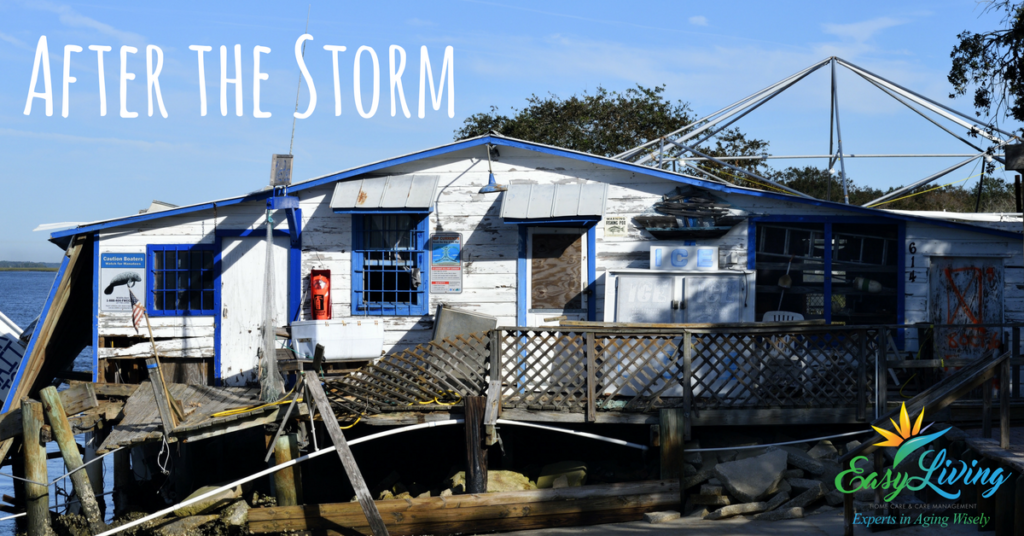It’s a relief when the immediate danger of a hurricane is over. However, many deaths and injuries occur in the days and weeks following a hurricane. Elders and those with chronic illness are most vulnerable at these times. Weeks can pass without electricity, supplies or various services. An elderly person living at home alone may be stranded with little support.
Dangers in the Aftermath of a Hurricane
- Carbon monoxide poisoning: often leads the list for injuries and death due to increased use of generators and gas grills/stoves
- Food-bourne illness: lack of drinking water and refrigeration along with limited supplies means people take risks with what they eat and drink
- Injuries sustained cleaning up or making repairs: people may go up to evaluate their roof, try to clear debris or take on other repairs they cannot handle to deal with hurricane damage
- Heat exhaustion/stroke
- Infections due to lack of clean water and unsanitary conditions
- Stress and trauma-related mental health issues
- Car accidents (crowded roads, flooding, poor conditions)
- Electrocution and fire hazards
- Illnesses carried by mosquitos: when there’s extra standing water after the hurricane, that provides a breeding grounds for the Aedes aegypti mosquitoes that spread Zika and other species that spread West Nile virus
- Lack of medical treatment: an inaccessible or overwhelmed medical system worsens outcomes for people with chronic illness or those who run into trouble with any of the above
Some Stats from Past Hurricane Aftermath
When Hurricane Iniki hit Hawaii in 1992, injuries went up by a factor of six, and more than half those injuries were open wounds.
The leading cause of death from Hurricane Ike was carbon-monoxide poisoning, and it accounted for 7% of Hurricane Sandy deaths.
After Hurricane Katrina, one study found that 14 percent of emergency visits to health care facilities were to treat chronic conditions. Almost 30 percent of those seeking care were sick enough to require admission, which is much higher than average for emergency departments. An additional 7 percent of emergency visits were to fill medications.
The toll on mental health may be harder to measure, but there was a 25% increase in depression diagnoses after Hurricane Sandy in the most affected zip codes.
Tips to Keep Safe After a Hurricane
- Safe generator and gas usage: the CDC advises people to keep generators at least 20 feet away from homes, including open windows. Don’t run a car or truck inside a garage attached to your house, even if you leave the door open. Don’t heat your house with a gas oven. A carbon monoxide monitor can warn you of dangerous levels. Also, be cautious of the electrical hazards (keep the generator dry, don’t plug it into a wall outlet, use proper cords, etc.).
- Be cautious when attempting repairs and debris removal. Warn your loved ones not to try to clean up on their own. Even if they’d normally be capable, the stress, heat and lack of water likely mean they’re weakened. Also, getting medical help if injured may be unlikely.
- Boil water if there’s a possibility of contamination.
- Don’t eat perishable food that hasn’t been properly refrigerated or thawed. Cook food properly.
- Do not drive through standing water. Be cautious when driving in bad weather conditions or congested roads.
For more details, visit Pinellas County Emergency Management: After the Storm and read What to Do After a Hurricane from the Red Cross.
What You Can Do For Elder Loved Ones in the Hurricane Aftermath
Establish contact to check in on them and do so regularly. Hopefully, you have a local support network to make an in-person visit as soon as possible. Contact providers, like your home care company, to see when they’ll be able to re-establish service. If your loved one is in a care facility, they will follow their communication plan as best they can to let you know what is happening.
Warn your loved one about the dangers (and tips) mentioned above. If they were well-supplied before the hurricane, they should have sufficient food, water, and medical supplies for their immediate needs. If they’ve been injured or are experiencing symptoms of illness, seek medical help as soon as possible.
Related Resources:
Debris removal in Pinellas County
Choosing a Contractor if major repairs are needed
Beware of Scams
Unfortunately, scammers love to take advantage of other people’s misfortune. Elders may be especially susceptible when waiting for help after the hurricane. Try to keep in close communication with your loved ones. Offer help locating service providers if the home needs repairs. Read more about price gouging, the laws to protect you and how to make a report to the Florida Attorney General (1-866-9-NO-SCAM).
For updates and resources, join us on Facebook. Contact us at 727-447-5845 for help with care needs, planning and more.







